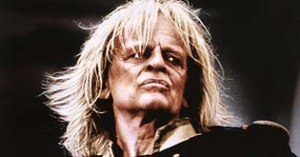Gallery
All Pictures (49)Biography
Klaus Kinski was born as Klaus-Günther Nakszynski in Zoppot/Ostpreußen (today: Sopot, Poland) on October 18, 1926. From 1931 on, he lived and went to school in Berlin. Drafted into military service, he became a British POW during WWII and had his first acting experience performing for his fellow inmates. After the war, he returned to Berlin and made his stage debut at the Schloßpark theatre, followed by engagements throughout the town and guest appearances at other theatres in Austria and West-Germany. In the early 1950s, he became famous for his exalted public readings of the works of Villon and Rimbaud.
Kinski started acting in movies as early as 1948, first appearing in minor roles, for instance as a transvestite in Roberto Rossellini's "La Paura", as demented prince Otto in Helmut Käutner's "Ludwig II.", as a lieutenant in Laslo Benedek's "Kinder, Mütter und ein General", and as an assassin in Fritz Kortner's "Sarajevo".
In "Die toten Augen von London", directed by Alfred Vohrer, Kinski left a lasting impression as the psychopathic bad guy, a part he continued to play in several more screen adaptations of crime novels by British writer Edgar Wallace. These films enjoyed enormous success in Germany, and therefore significantly shaped Kinski's public image.
From 1964 on, Kinski resided in Rome and was cast for many international productions. He starred in Sergio Leone's "Per qualche dollari in più", appeared in "Doctor Zhivago" by David Lean, and excelled as merciless bounty hunter Tigrero in Sergio Corbucci"s pessimistic Western "Il Grande Silencio". His trademark looks and exuberant performances made Kinski the star of many B-pictures and exploitation films in the 1960s, most of which were sold on the promise of Action, Sex and Horror.
Yet the 1970s saw the actor return to more demanding roles, most prominently in the films of maverick director Werner Herzog, with whom Kinski established a unique creative and personal relationship. Films like "Aguirre, der Zorn Gottes", "Nosferatu – Phantom der Nacht", "Woyzeck" or "Fitzcarraldo" were hailed as daring cinematic adventures and also thrived on the much publicised tensions between the two uncompromising artists.
Kinski also continued to appear in international features, most notably as a neurotic sex scientist in Billy Wilder's comedy "Buddy Buddy" and alongside Romy Schneider in Andrzej Zulawski's melodrama "L'Important c'est d'aimer".
In 1987/88 Kinski finally realized a longtime project of his in the form of "Kinski – Paganini". Kinski, whose daughter Nastassja Kinski (born 1961) also became a famous screen actress in the late 1970s, remained a flamboyant celebrity all his life: He was notorious – and also in high demand – for his scandalous TV appearances and interviews, and his candid autobiography "Ich bin so wild nach deinem Eredbeermund" became a much-talked about bestseller.
Klaus Kinski passed away in Labunita, CA (USA) on November 21, 1991.
